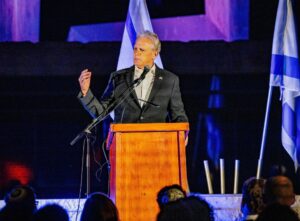MODI’IN, Israel – In a clearing in the Bet Shemen Forest of the Jewish National Fund, the picnic tables that were spread out looked like any park that any Experience Israel 2023 participant could’ve had at any park in Minnesota.
But what was different Monday night was that it was the start of Yom HaShoah, the day Israel commemorates the 6 million Jews murdered in the Holocaust. Twenty-two trip participants who are descendants of survivors told small groups their family stories around those picnic tables over dinner. Stories of survival and hope.
Julie Golod told the story of her grandmother, who was 15 or 16 when the Nazis invaded Belarus. Her grandmother’s family lived in Minsk and ended up in the MInsk Ghetto because they wouldn’t leave when they had the chance.
“It was a close-knit community, and somebody offered her parents to help them leave. And they said they wouldn’t leave without the others,” Golod said.
Once in ghettos, they were taken to German areas for a work detail, where they had to clean the houses of the German soldiers. Golod’s great-grandfather – her mother’s dad – was a tailor, which got him a job in a factory making uniforms for the Germans.
“It’s just that they were lucky that way that they got to move to a special area for highly skilled workers,” she said.
But there were also heartbreaking stories she learned, like the time when they were in hiding and a 9-month-old baby who was crying was smothered by their uncle to prevent the Nazi soldiers from finding them.
“I remember her telling me that story,” Golod said. “As a kid that makes an impact on you.”
The second part of the commemoration was at the Monument to the Martyrs of Zaglebie, a region in southwestern Poland, where 100,000 Jews lived before World War II; the few that survived moved to Israel after the war. The event ended with the 22 participants lighting a candle in honor or memory of family that were in the Holocaust. It was started by Rita Kelner, who is one of the co-chairs of the trip, telling the story of her father’s Holocaust survival in a pre-recorded video.
“Tonight, we come together as a community on Yom Hashoah to remember the darkest time for world Jewry,” she said. “In these times where antisemitism is so prevalent, many of us worry about how it is going to affect our future generations, our children, our grandchildren, we worry about ourselves and our community.

Amb. Michael Oren gave the keynote address at the Yom Ha’Shoah commemoration. (Photo by Ethan Roberts Photography)
“It is our duty, our responsibility, in memory of those who perished during the Holocaust, to make sure that Israel continues to exist. As we remember the 6 million Jewish men, women, and children who were murdered during the Holocaust. Help us to keep such horrors from ever happening again. Let us never forget.”
The keynote speaker was Israel’s former ambassador to the U.S., Michael Oren. Oren made aliyah to Israel from New Jersey in 1979, where he served in the IDF. His father and uncle both served in the U.S. military during World War II.
“In March 1945, [my uncle] Joe liberated a concentration camp and he had one of these little Leica cameras and he took photographs,” Oren said. “I don’t think my Uncle Joe ever recovered from that.”
Oren said that the photos taken were in an album in a small cubby in the basement, out of the way. He said it comes back to a time in the 1960s when there was a stigma associated with it.
“Our Holocaust then was a Holocaust of shame. Our Holocaust was a Holocaust of atonement,” he said. “Elie [Wiesel’s] message was a message of tolerance, of love. A redemptive message. It’s a message of hope. But it also was a message of awareness. It made us aware and made us face up to our dark history.”
The event was planned by Minneapolis Jewish Federation’s Grace Kaplan. Kaplan explained that each staff signed up for an evening event to help plan and this one was appealing to her, particularly as the granddaughter of a survivor.
“As the grandchild of a survivor, it’s super important to help continue to share my family story,” she said. “It’s just a miracle we’re all here and together in Israel, too.”




Great article. I am on the trip with you and want to subscribe to your newsletter. Please sign me up!